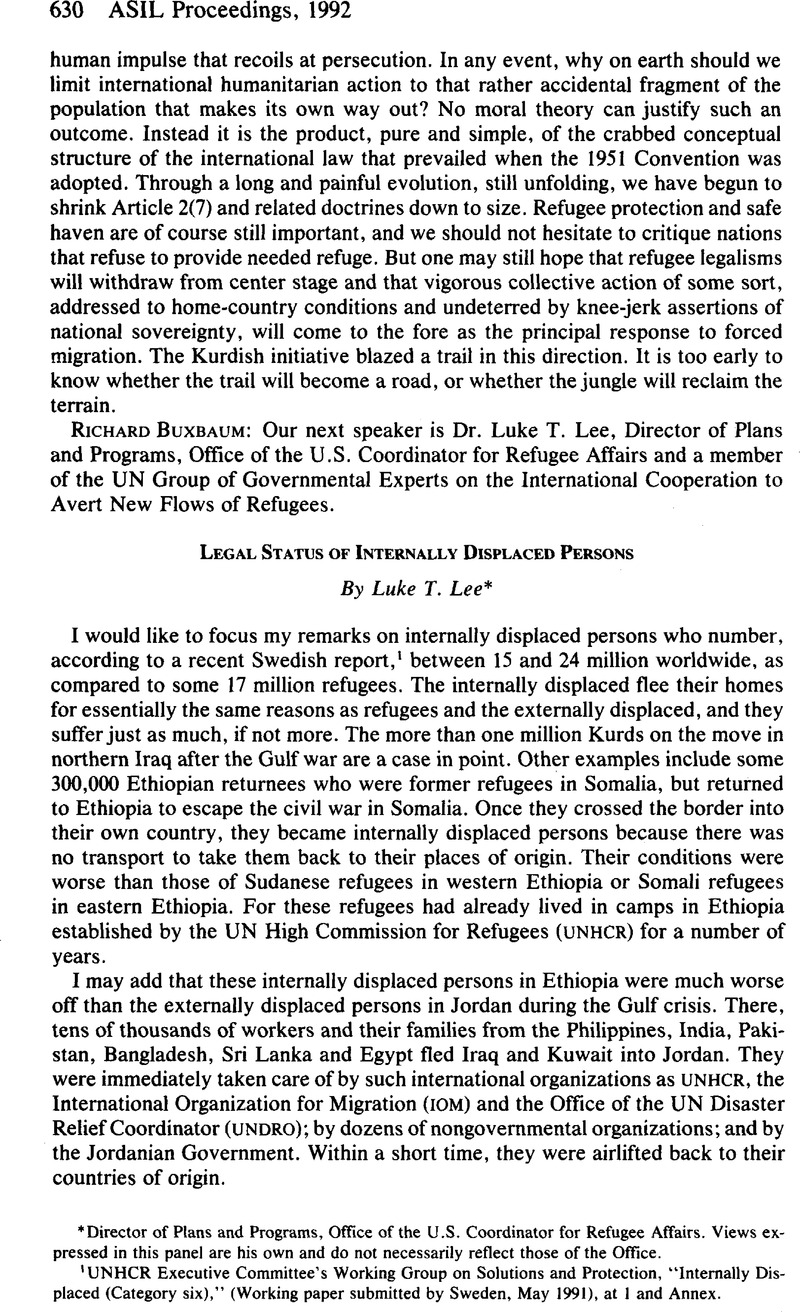No CrossRef data available.
Article contents
Legal Status of Internally Displaced Persons
Published online by Cambridge University Press: 28 February 2017
Abstract

- Type
- Widespread Migration: The Role of International Law and Institutions
- Information
- Copyright
- Copyright © American Society of International Law 1988
References
1 UNHCR Executive Committee’s Working Group on Solutions and Protection, “Internally Displaced (Category six),” (Working paper submitted by Sweden, May 1991), at 1 and Annex.
2 Humphrey Waldock, Human Rights in Contemporary International Law and the Significance of the European Convention, 11 Int’l & Comp. L.Q. 3 (Suppl. 1965).
3 Myres S. McDougal et al., Human Rights and World Public Order 766 & n. 100 (1980).
4 Convention Relating to the Status of Refugees, done July 28, 1951, 189 UNTS 137, art. 1(A)(2). Under the municipal law of some countries, “refugee” status may be given to people within their countries of origin. For example, Title II, §201(42) of the U.S. Refugee Act of 1980 (Pub. L. No. 96-212, 94 Stat. 102) defines “refugee” to mean, inter alia: (b) in such special circumstances as the President after appropriate consultation … may specify, any person who is within the country of such person’s nationality or, in the case of a person having no nationality, within the country in which such person is habitually residing, and who is persecuted or who has a well-founded fear of persecution on account of race, religion, nationality, membership in a particular social group, or political opinion. This provision provided the basis for the Orderly Departure Program (ODP) administered by UNHCR, under which “refugees” are airlifted from Ho Chi Minh City to Bangkok for onward journey to resettlement countries. As of February 1992, in-country processing of Haitian asylum seekers has taken place in the Consular Section of the U.S. Embassy in Port-au-Prince; this recognizes their refugee status within country of origin.
5 For the implications of the Peace of Westphalia, see Leo Gross, The Peace of Westphalia, 1648-1948, 42 AJIL 20, 28-29 (1948).
6 John Bolton, Rethinking the Refugee Definition and the UN Role, The Second Annual Refugee Day (Office of the U.S. Coordinator for Refugee Affairs, forthcoming 1992).
7 The Eleanor, Instance Court 135, 159-60 (1809).
8 Judgment of 1832 (The Carlo-Alberto), Cass., 1832 Sirey, part i, at 577.
9 Award of Aug. 23, 1958. Official text published by the tribunal in 1958 in English and Arabic. See C. John Colombos. The International Law of the Sea at 176-77 (6th ed. 1967).
10 Bernard Kouchner, The Right of Humanitarian Intervention, supra note 6.
11 See text in 78 ASIL PROC. 344 (1984).
12 International Law Association, Report of the Sixty-Second Conference: Seoul (1986), at 12-18.
13 OEA/Ser. F/V.l, MRE/Res. 1/91, (3 Oct. 1991).
14 Reprinted in 30 ILM 858 (1991).


